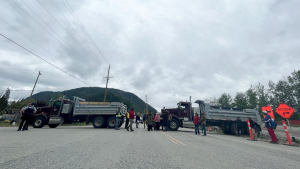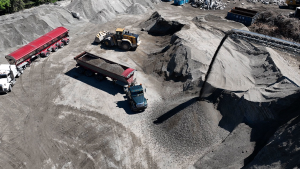The recent bouts of extreme weather in British Columbia – floods, heat waves and wildfires – have made many people wonder what they can do to protect the environment.
A recent event called Future-proofing Vancouver: Climate Talk versus Climate Action, asked local experts and an audience of interested participants to tackle the question.
Sponsored by the Vancouver Economic Commission (VEC) and the Simon Fraser University (SFU) Beedie School of Business, the event featured panelists Andreanne Doyon, Arman Mottaghi, David Oliver, and Akua Schatz. The moderator was George Benson, VEC manager of economic transformation.
“This is the world we live in with less than 1.5 degrees of warming,” said Benson. “If we keep talking about 2050 and pretend we can act in 2049… we’re going to be in a situation where we don’t have the resources to fully respond to the challenge.”
Although the panellists spoke individually, their comments, taken together, covered some common themes:
* If at first you don’t succeed, try again. It can’t be known in advance what will work and what won’t. If a climate action idea doesn’t pan out the first time, try another angle.
* Be open to different opinions. Not everyone agrees on the cause of a climate problem, let alone its solution.
* Effective climate action requires the public sector, the private sector and individuals working together. Each actor is important and each needs to be open to suggestions from the others.
* Time is of the essence. The work that is done today will pay big benefits in the future, because it adds up over time, like compound interest.
* Keep it simple when talking about future-proofing. Make complex ideas easy so that everyone understands them.
Doyon, director of the resource and environmental planning program at SFU, said the climate emergency is so dire that every aspect of our lives needs to be reconsidered.
Because most of the world’s population lives in cities, climate change will be felt most strongly there.
“Sixty per cent of the world’s GDP is produced in coastal cities, such as Vancouver,” said Doyon. “Because municipal government is the level of government closest to people, and the one that is the most trusted, cities can work with their residents to bring positive change.”
Schatz, vice-president, market engagement and advocacy with the Canada Green Building Council, said buildings are responsible for about one half of emissions in most Canadian cities.
Building owners can adapt to climate change by using such innovations as heat pumps, more energy-efficient building materials with fewer embodied carbons and better building envelopes.
“The pressure is on now to show investors and lenders how you’re dealing with emissions reductions,” Schatz said. “ESG (environmental, social, governance) disclosures are no longer things that are nice to have, but things that are essential.”
Mottaghi, the CEO of Properate, a Vancouver company that develops energy-efficiency software, said, “We need to convert the people who are committed to the cause into buyers, by equipping them with the information they need to make a decision.
“When we can show the savings and value-add of practical solutions, we’ll have won half the battle.”
He said VEC recently published a study on market trends in the building industry “with numerous actionable insights, such as triple-glazed windows.”
“Such windows may seem futuristic today, but they’ll soon be the norm, as they are in Europe,” said Mottaghi.
Oliver, CEO and co-founder of Greenlines Technology Inc., which develops decarbonization software, said the best way to change individuals’ behaviour is by offering them financial incentives.
“Whether this takes the form of penalties or rewards for good behaviour, carbon markets provide climate solutions that are easily scalable from systems to the individual,” Oliver said. “With so few opportunities for quantifiable individual action, we need to give everyone who wants to act a choice and a tool. That tool could be a financial instrument that feeds into carbon markets.”
Future-proofing Vancouver: Climate Talk versus Climate Action was preceded in March by Future-proofing Vancouver: How to Build the Future We Want to Live In.
Panellists at that event discussed a number of topics such as social inequalities made worse by the global pandemic; enhancing Vancouver’s role as a pioneering world city; reimagining GDP to include Indigenous values; and envisioning a future of zero-emission transportation that is already being realized.
Future-proofing Vancouver is a VEC platform that promotes the work of the Economic Transformation Lab, a research program that prepares Vancouver’s economy for emerging global trends.
The next topics planned for Future-proofing Vancouver will deal with non-GDP measurement of well-being and the implementation of a circular economy of food in Vancouver.











Working four 9 hours a day per week reduces commuter transportation & construction emissions by 20%, three 12 hours a day per week reduces 40% of emissions, free transit reduces transportation emissions even more. Canadians can start Monday won’t cost us a dime.
However our government’s Canadian Net-Zero Emissions Accountability Act is designed to steal billions of dollars from Canadians with their Liberal – NDP non science based ideological agenda. For example the predictive costs for a similar EU electric vehicle rule for France is estimated at €72 billion a year plus the loss of b in fuel taxes as more cars on the road become electric.
How much more economic pain will Canadians put up with as they get driven into poverty by Ottawa when all we have to do is change our human activities time schedules to lessen to our impact on the environment?